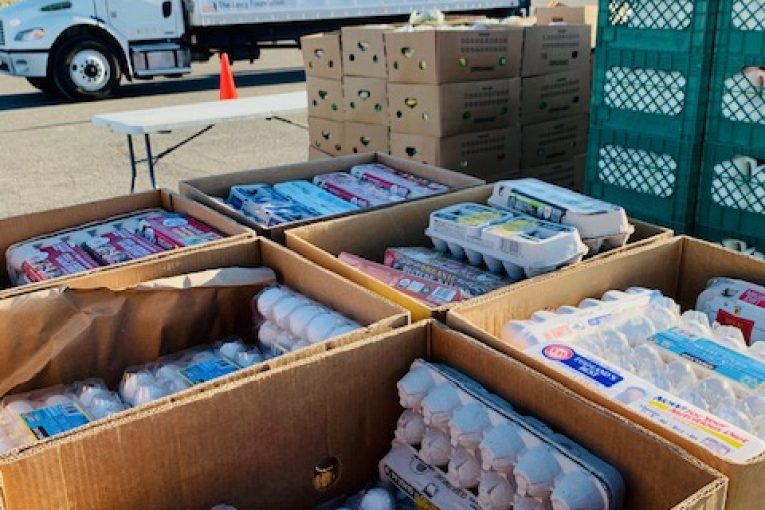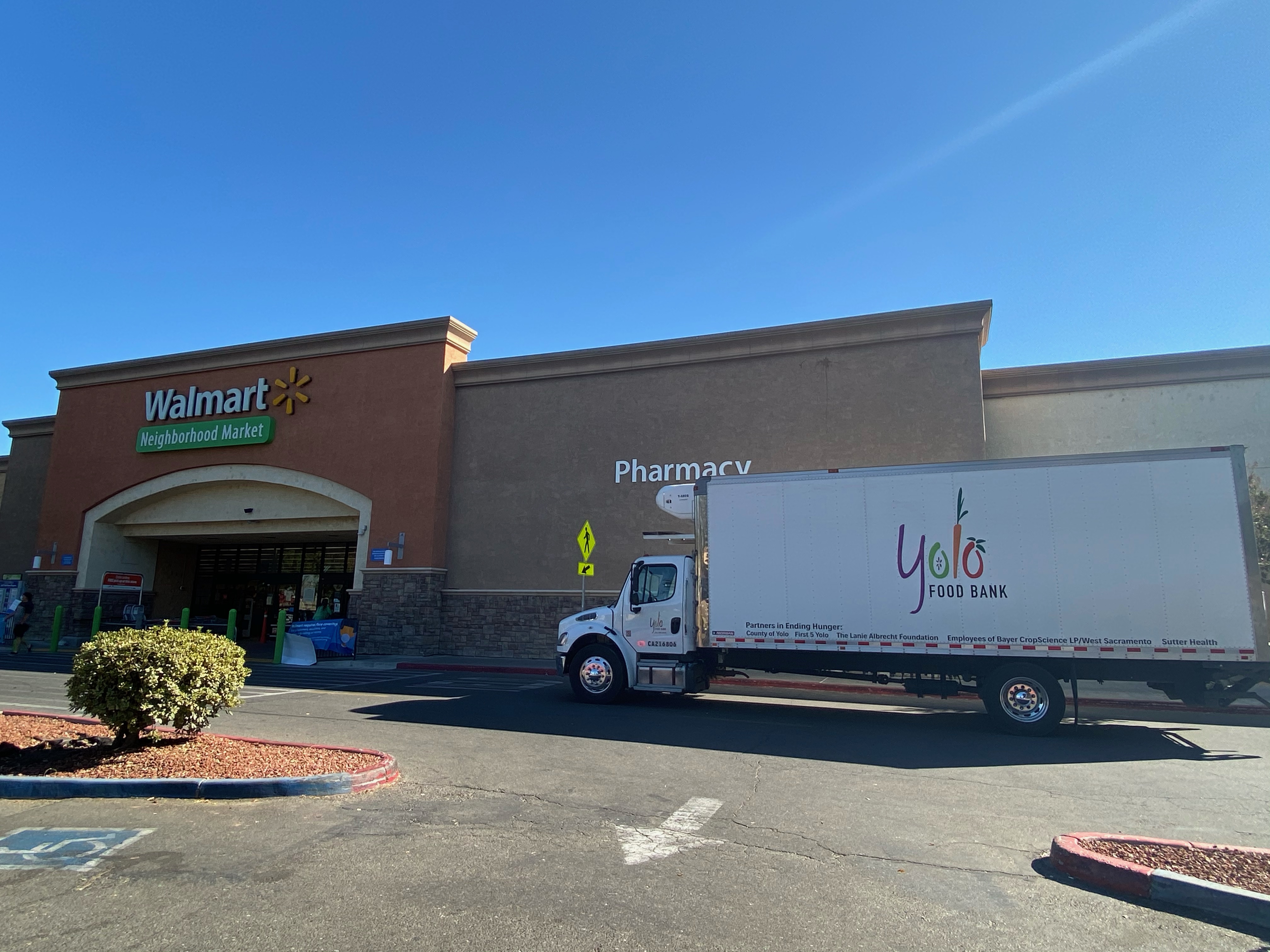

Special To the Vanguard
Woodland, CA – More than 160 stakeholders in the Yolo County social safety net – including Sutter Davis Hospital, CommuniCare, Nugget Markets, and multiple representatives of UC Davis and all three Yolo County community college campuses – have signed letters advocating for a comprehensive, countywide surplus edible food recovery and distribution program, to benefit both food insecure residents and community health, as well as to reduce the environmental impacts of food sent to the Yolo County Central Landfill to rot.
This landmark show of support was sent earlier this week by Yolo Food Bank to elected officials and their staff members at the Yolo County Board of Supervisors and the City Councils of Woodland, Davis, West Sacramento, and Winters. Additional stakeholders include community members, civic and business leaders, donors, volunteers, and local nonprofit organizations, stating that a food secure Yolo County is a top priority. All letters and lists of signatories may be viewed at https://yolofoodbank.org/in-the-news/food-recovery-support-letter/.
“Redirecting surplus edible food from the Central Landfill to nourish Yolo County residents lacking consistent access to fresh, healthy food, is well-recognized by these stakeholders as critical to improved health and socioeconomic outcomes, as well as environmental sustainability,” stated Michael Bisch, Executive Director, Yolo Food Bank.
“Collectively, these letters are but one indicator of broad public support for a fully-funded, countywide edible food recovery program in partnership with Yolo Food Bank,” Bisch added. “Other powerful indicators of such public support recently have included panel and participant discussions during the recent Yolo Community Foundation COVID-19 Community Needs Series, Valley Vision polling results, Yolo County workshop conversations, and the experiences of the more than 80 Yolo Food Bank Nonprofit Partner Organization programs benefiting from our food recovery and distributions.”
Statewide consulting firms and state agencies, such as CalRecycle, are on record expressing that Yolo Food Bank, together with its nonprofit partners, operates the premier surplus edible food recovery and distribution program in the State of California.
“Yolo Food Bank has both the necessary experience and expertise and has established surplus edible food recovery as the most cost-effective means of achieving food security in Yolo County,”  shared William Schoen, Project Director with R3 Consulting Group, a Roseville-based solid waste management firm. “This is because the food is donated, not purchased, leaving only the logistics costs to collect and distribute that food to be covered, such as transportation, appropriate storage, sorting and packing, and related staffing. Every dollar invested in these logistics results in the distribution of approximately $5 worth of food to food insecure neighbors, changing lives in every city and community in Yolo County.”
shared William Schoen, Project Director with R3 Consulting Group, a Roseville-based solid waste management firm. “This is because the food is donated, not purchased, leaving only the logistics costs to collect and distribute that food to be covered, such as transportation, appropriate storage, sorting and packing, and related staffing. Every dollar invested in these logistics results in the distribution of approximately $5 worth of food to food insecure neighbors, changing lives in every city and community in Yolo County.”
The ongoing logistics of Yolo Food Bank’s food recovery and distribution work potentially could be funded in perpetuity as part of the January 1 implementation of SB 1383, state legislation mandating food recovery and distribution activity, amongst other initiatives to divert organics from landfills. Officials in Yolo County – and statewide – currently are grappling with implementation details and funding models, such as a rate-based approach. Passed five years ago, SB 1383 requires all jurisdictions in the state to develop, fund, and implement plans for food recovery and redirection for human consumption in their communities.
Yolo Food Bank leadership believes that the organization’s food recovery and distribution program is the single most impactful, cost-effective, large-scale social program in the county, while simultaneously and cost-effectively battling climate change. Once in the landfill, food is among the organics that ultimately emit methane gas, a pollutant 84 times more toxic than carbon dioxide, into the environment.
“It seems that local jurisdictions, and the consultants whom they’ve engaged, are concerned with program expense,” Bisch related. “However, compared with the enormous community investments required to address the poor health and disease outcomes, diminished economic and academic results, negative impacts upon affordable housing and homelessness, and perpetual racial and cultural inequities that stem from persistent food insecurity – as well as the environmental impacts of methane gas emissions – a commitment to invest in a surplus edible food recovery and distribution program with Yolo Food Bank is a smart and logical choice.”
Currently, Yolo Food Bank relies upon the generosity and capacity of private donors to fund the majority of the food recovery and distribution activity required to meet the food access demands of more than 60,000 Yolo County residents each month, a three-fold increase over the pre-pandemic service level. The size and frequency of donors’ gifts are dependent upon their inclination to contribute and their own economic prosperity, meaning that the funding base is not dependable, particularly in the face of the elevated SB 1383-mandated food recovery and distribution activity.
Bisch said it’s understandable that the county and the cities find the implementation of SB 1383 food recovery mandates to be challenging, and empathizes with the temptation to view the compliance steps as, “…boxes to be checked to stay ahead of penalties.” But, he believes that the will of constituents and elected leaders’ vision for Yolo County’s future can make a difference.
“Our Yolo County Board of Supervisors, our mayors, and our city councils can be the leaders who ensured the expansion and continuity of the State of California’s model food recovery and distribution program, and their legacy can be one of bold actions to create change for generations of Yolo County residents,” Bisch shared. “As opportunities to influence and approve these actions occur over the coming weeks and months, Yolo Food Bank looks forward to deepening partnerships with local government to make it so.”
To donate, volunteer, or learn more about Yolo Food Bank, visit www.yolofoodbank.org.

How is what we have now, NOT comprehensive or countywide? To paraphrase ZZ Top, “I’m bad, I’m not countywide; I’m bad, I’m not countywide” – #guitar riff#
Sounds like someone didn’t read The Grapes of Wrath
You (whomever you are) say that like that’s a bad thing . . .
Vanguard readers believe Yolo Food Bank leadership believe very highly in themselves.
Right up there with the impact of China and India shutting down all their coal-fired power generating stations.
We smell MONEY! Right here in Putah City. Government money and lots of it! A capitol “G” and that rimes with “P”.
Such as . . . swarms of seagulls?
Rate based approach changing rates to who or whom for what?
Fund? As in, SB 1383 is an unfunded mandate?
yeah, cuz the state, as it often does, said ‘do this and figure out how to pay for it yourselves‘. Thanks, corrupt one-party super-majority Golden Bear.
Actually, the smart and logical choice is put the food in the landfill and build grant-subsidized power generating units that run off the burning of methane gas and the ghosts of flying cars. We must maximize our methane! How can one put starving children ahead of power generation for our laptops and keeping the UC Davis water tower lit at night?
Setting up such an expensive program is easily fixed: remember those road pavement upgrades programs and bike path repairs? Put off until 2074, or in ‘perpetuity’. Problem solved
And a partridge in a pear tree
It’s special alright – immaculate even – it doesn’t have an author that conceived it. It’s a miracle!
Another miracle!
You (whomever you are) say that like that’s a bad thing . . .
So, YFB believes it is currently well run, among the most efficient in the country, and relies on private donors. The solution to being well run and efficient? Government subsidy. As a wise friend once said, ‘the only thing worse than not having enough money — (for a non-profit or government entity) — is having enough money’. Often applies to individuals as well.
Now if they could just find a way to divert those plastic bags.